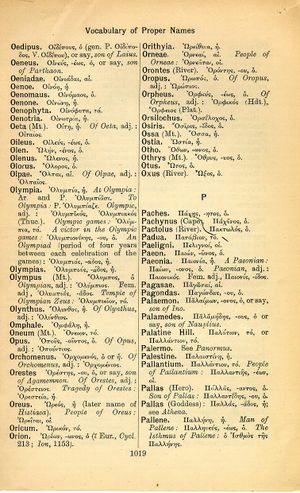Ostia
English > Greek (Woodhouse)
Ὠστία, ἡ.
Latin > English (Lewis & Short)
Ostĭa: ae, f., and Ostĭa, ōrum, n. ostium; cf. Engl. mouth, in Ply-mouth, Yar-mouth, etc.,
I a seaport town in Latium, at the mouth of the Tiber, built by Ancus Marcius, still called Ostia: Ostiam urbem ad exitum Tiberis in mare fluentis Ancus Marcius rex condidisse fertur, Paul. ex Fest. p. 197 Müll.; cf.: urbs, quam secundum ostium Tiberis (Ancus Marcius) posuit, ex quo etiam Ostiam. id. s. v. Quiritium, p. 254 ib.; Enn. ap. Paul. ex Fest. s. v. quaeso, p. 258 ib. (Ann. v. 145 Vahl.): in ore Tiberis Ostia urbs condita, Liv. 1, 33 fin.; Cic. Rep. 2, 3, 5.—Form Ostia, ōrum, Liv. 9, 19, 4; 23, 37, 1.—Hence,
II Ostĭen-sis, e, adj., of or belonging to Ostia, Ostian (class.): Ostiensis ager, Cic. Att. 12, 23, 3; Liv. 8, 12: populus, id. 27, 38: quaestor (L. Saturninus), Cic. Sest. 17, 39: portus, Plin. 9, 6, 5, § 14: provincia, the duty of one of the quœstors to superintend the aqueducts leading to Rome, and the supplying of Rome with corn, Cic. Mur. 8, 18; Suet. Claud. 24: incommodum, the capture of the Roman fleet by pirates at Ostia, Cic. Imp. Pomp. 12, 33.

